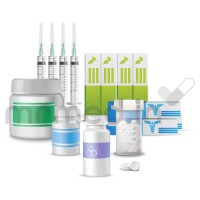Aphyren Capsule contains an active component as acebrophylline. It is a medication used to manage respiratory conditions such as bronchial asthma and chronic obstructive pulmonary disease (COPD). It can alleviate symptoms associated with respiratory conditions, such as wheezing, coughing, shortness of breath, and chest tightness. Improving bronchodilation and reducing airway inflammation can help individuals experience fewer and less severe symptoms. This medication has improved lung function parameters such as forced expiratory volume in one second (FEV1) and peak expiratory flow rate (PEFR). These improvements indicate better respiratory function and can contribute to overall lung health.
Aphyren Capsule is often used with other respiratory medications, such as inhaled bronchodilators and corticosteroids. It can complement the effects of these medications and provide additional benefits regarding bronchodilation and mucus clearance. This medication should not be used in individuals with known hypersensitivity or allergy to Aphyren Capsule, theophylline, ambroxol, or other medication components. This medication can cause an increase in blood pressure. It should be used cautiously in individuals with uncontrolled hypertension (high blood pressure) or severe cardiovascular and renal disease patients. It is contraindicated in individuals with a history of seizures or seizure disorders, as well as those who are at a high risk of developing seizures. Aphyren Capsule is generally not recommended for use in infants under the age of 12 months due to limited safety and efficacy data in this age group.
- Bronchial asthma
- Chronic obstructive pulmonary disease (COPD)
Therapeutic Effects of Aphyren Capsule
Pregnancy
Limited data are available regarding Aphyren Capsule safety during pregnancy, so its use during pregnancy should be discussed and carefully evaluated by a healthcare professional.
Breast Feeding
The safety of Aphyren Capsule during breastfeeding is not well established, and it is recommended to exercise caution and consult with a healthcare professional before using this medication while breastfeeding.
Lungs
Aphyren Capsule is primarily used for respiratory conditions and is generally considered safe for the lungs when used as directed. Its therapeutic effects, such as bronchodilation and mucus clearance, improve lung function and symptom relief in bronchial asthma and chronic obstructive pulmonary disease (COPD).
Liver
Theophylline, one of the components of Aphyren Capsule, is primarily metabolized by the liver. Impaired liver function can affect the metabolism and clearance of theophylline, potentially leading to increased levels of the drug in the body and an increased risk of side effects.
Alcohol
It is generally recommended to avoid consuming alcohol while taking Aphyren Capsule. Alcohol can interact with theophylline, one of the components of this medication, and potentially increase the risk of side effects.
Driving
Aphyren Capsule may cause side effects that can impair driving ability and overall alertness. Common side effects include dizziness, headache, and tremors, which can affect coordination and reaction time.
Serious:
- Allergic reactions
- Skin rashes
- Fungal infections
- Cardiac arrhythmias
- Seizures
Common:
- Nausea
- Vomiting
- Stomach discomfort
- Abdominal pain
- Headache
- Tremors
- Palpitations
Aphyren Capsule may require dose adjustments in individuals with severe renal impairment. The medication is primarily excreted through the kidneys, and reduced kidney function can affect its clearance from the body. It is important to consult with a healthcare professional who can assess your renal function and determine the appropriate dosage or alternative treatment options if needed.
Abruptly stopping Aphyren Capsule without medical guidance is not recommended. Suddenly discontinuing the medication can lead to withdrawal symptoms, such as headache, irritability, nausea, and restlessness. It is important to follow the instructions provided by your healthcare provider regarding the duration of treatment and any tapering of the medication if necessary.
Yes, gastrointestinal side effects such as nausea, vomiting, abdominal discomfort, and diarrhea can occur using Aphyren Capsule. If these side effects are persistent or bothersome, consult your healthcare provider, who can guide managing these symptoms or adjust the dosage if necessary.
Long-term side effects specific to Aphyren Capsule need to be well-documented. However, like any medication, it may have potential risks and side effects. Regular monitoring and follow-up with your healthcare provider are important to assess any long-term effects and adjust the treatment plan if necessary.
If you have a known heart condition, it is important to exercise caution when taking Aphyren Capsule. The medication can potentially affect heart rate and rhythm, leading to palpitations or arrhythmias. Consult with your healthcare provider, who can assess your specific cardiac condition and determine if this medication is suitable for you or if alternative treatments are more appropriate.
Individuals with liver or kidney impairment may require dose adjustments when taking Aphyren Capsule to prevent drug accumulation and potential toxicity. It is crucial to inform your healthcare provider about any liver or kidney conditions you have, as well as any medications you are currently taking. Your healthcare provider can assess your situation and determine the appropriate dosage or suggest alternative treatments if necessary.
Molecule name: Acebrophylline | Therapeutic class: Respiratory agent |
Pharmacological class: Theophylline: Bronchodilator Ambroxol: Mucoregulator | Indications: 1. Asthma 2. COPD |









-200x200.jpg)
-200x200.jpg)